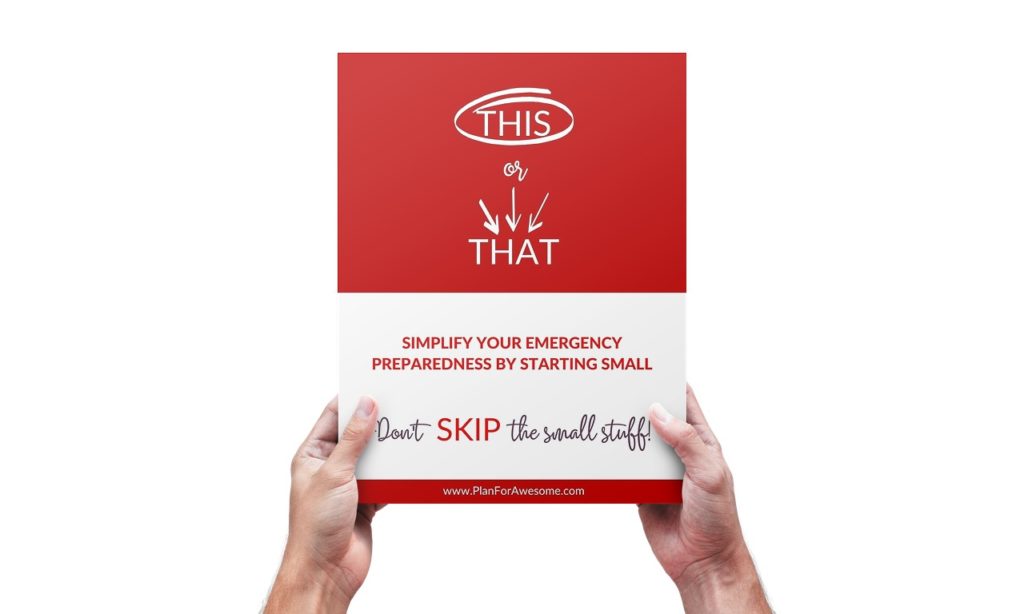
How to Decide the best size of berkey water filter
These are the things I recommend you consider when deciding what the best size of Berkey would fit your needs, and a side-by-side comparison between a Berkey Light and a Crown Berkey.

**This post contains affiliate links, which means if you click on a link and make a purchase, I may make a small commission at no extra cost to you.
Water storage is great … if you are able to stay home.
But what if you’re evacuated? Or what if your stored water at home runs out?
Your emergency water plan isn’t complete without a way to filter water to make it safe to drink and cook with.
Sure, you’ve got options:
But … wouldn’t getting a water filter that takes care of it for you be easier than guessing which of those methods you should use?
That’s why I am such a big fan of our Berkey Water Filter!
I love knowing that my Berkey filter can filter pretty much anything.
A situation where I need to filter water sounds stressful enough! I want a water filtration plan that I can have confidence in.
Because Black Berkey Filters remove pathogens at such a high level, the filters are classified as water purifiers that remove 99.9999% of bacteria and 99.999% of viruses. This distinction is what makes Berkey the only certifiable gravity flow water purification system on the market.
Arsenic, Bacteria, Chlorine, E. Coli, Giardia, Micro Organisms, Pesticides and VOCs are just a few of the contaminants that it removes. If you are concerned about something specific based on where you live (or just like to nerd out on the details) check out their complete list of covered contaminants here.
The shorter list is what IS in Berkey water, because it is pure, delicious water: Hydrogen, oxygen, and beneficial minerals. Nothing else! Unlike other water filtering options (like reverse osmosis), Berkey water is not stripped of the good stuff that our bodies actually need.
Berkey water is slightly alkaline because the ionic minerals (aka beneficial minerals) are able to pass through the filters, while the sedimentary minerals are blocked. Berkey water is also aerated because water drips from the top chamber to the bottom chamber as well as through the spigot. The combination of those things is what helps the water taste so dang good!
The bottom line is, with my Berkey, I know that I can just throw contaminated water in the filter and feel safe.
One huge plus with a Berkey Water Filtration System is that it is mobile!
Not only can it be used in your home for things like water boil advisories, but you can also take it with you in an evacuation.
No, you can’t really fit it in your 72-hour kit, but it is at the top of our grab list for evacuation purposes and we would be able to take it wherever we go.
I also love that I can use my Berkey to filter our daily water. It sits on a little table in our dining room and it’s where we fill our water bottles, pitchers, etc. To sweeten the deal further, we are actually saving money because we decided to stop buying filters for our fridge. The Berkey water is so much better! The only filtered water we use the fridge for is our icemaker, so I just don’t worry about replacing that filter.
Each filter filters 3,000 gallons of “normal” water (if your water is awful in an emergency situation where you’re drinking disgusting lake water, they’re not gonna last quite as long).
If you’re running two filters in one system, that’s 6,000 gallons you could filter before needing to replace them!
We put about 2.5 gallons through our Berkey filter every day, which means our filters should last over 6 years.
6,000/2.5 gallons per day = 2,400 days
2,400/365 days = about 6.5 years!
That’s a heck of a lot better than replacing our fridge water filter every 6 months!
As long as Berkey filters are kept dry, you can keep them forever! Having safe drinking water with an indefinite shelf life is pretty amazing! (It is recommended that you test the filters when you get them to make sure they’re working properly, although I have never gotten one that didn’t work. Just make sure they are completely dry before you pack them away).
I keep a few on hand for emergency backup.
California basically has dumb hoops you have to jump through to certify that your water filter is good enough to pass CA’s standards. Which is ridiculous, because Berkey is seriously one of THE BEST on the market.
But of course CA’s real objective is not to help its people, but rather to put money in its pocket. So they make it so dang expensive to jump through all these hoops that Berkey basically said no thanks.
So I ordered mine and had it shipped to my in-laws’ house in Utah, and picked it up when we went there for Christmas.
Berkey is able to sell some of their smaller units in CA, which is TRIPLE DUMB, because they use the SAME EXACT FILTERS in all of their systems! It’s seriously SO DUMB.
Moral of the story?
Don’t let California wreck your day. Just have it shipped to a friend or family member who doesn’t live in this dumb state.
They do recommend testing your filters every 6ish months. To do that, you just put red food coloring in the water in the top chamber and make sure it filters out clear. Easy peasy!
Yes! It is the best! (or…one of the best…I don’t use absolutes)
And I love that it filters so much water.
An RO unit is awesome, but keep in mind it takes everything out including the good stuff (the minerals) in your water. So you might need to look at supplements if you’re using RO.
So easy. Unscrew the filters and handwash the parts and chambers with warm, soapy water. I use Dawn dish soap. Do not use soap on the filters. You only need to clean them once every 6 months. You just use a scotch pad. No cleaner, no soap. My filters have actually never been “dirty.”
The easiest way to increase your Berkey’s filtration speed is by doubling the amount of Black Berkey filters in your system. Adding an extra pair of Black Filters to your system doubles your filtration rate, cutting the time needed to filter your water in half.
If you are noticing that a filter is filtering just plain slower than normal, it may need to be primed again, which happens if the top chamber sits without water in it for more than 24ish hours.
If you’re in a situation where you have to use a water filter to make your water safe, wouldn’t you want a filter that absolutely filters out all the dangerous things, guaranteed? I don’t know about you, but I don’t want to have to wonder if someone is going to end up super sick, because I went cheap on a water filter.
If you want to have total confidence in the safety of your water, get a Berkey!
I’m not gonna lie – I initially purchased a Crown Berkey, only to find out that the system I really wanted was a Berkey Light.
Click here to read about all the things I wish I’d known before deciding which Berkey to buy.

These are the things I recommend you consider when deciding what the best size of Berkey would fit your needs, and a side-by-side comparison between a Berkey Light and a Crown Berkey.

Answers to some of your most asked questions about long-term food storage, including the difference between dehydrated and freeze dried food.

If you are totally overwhelmed this simple 72-hour kit schedule will keep you focused so you can actually finish your family’s emergency kits.
